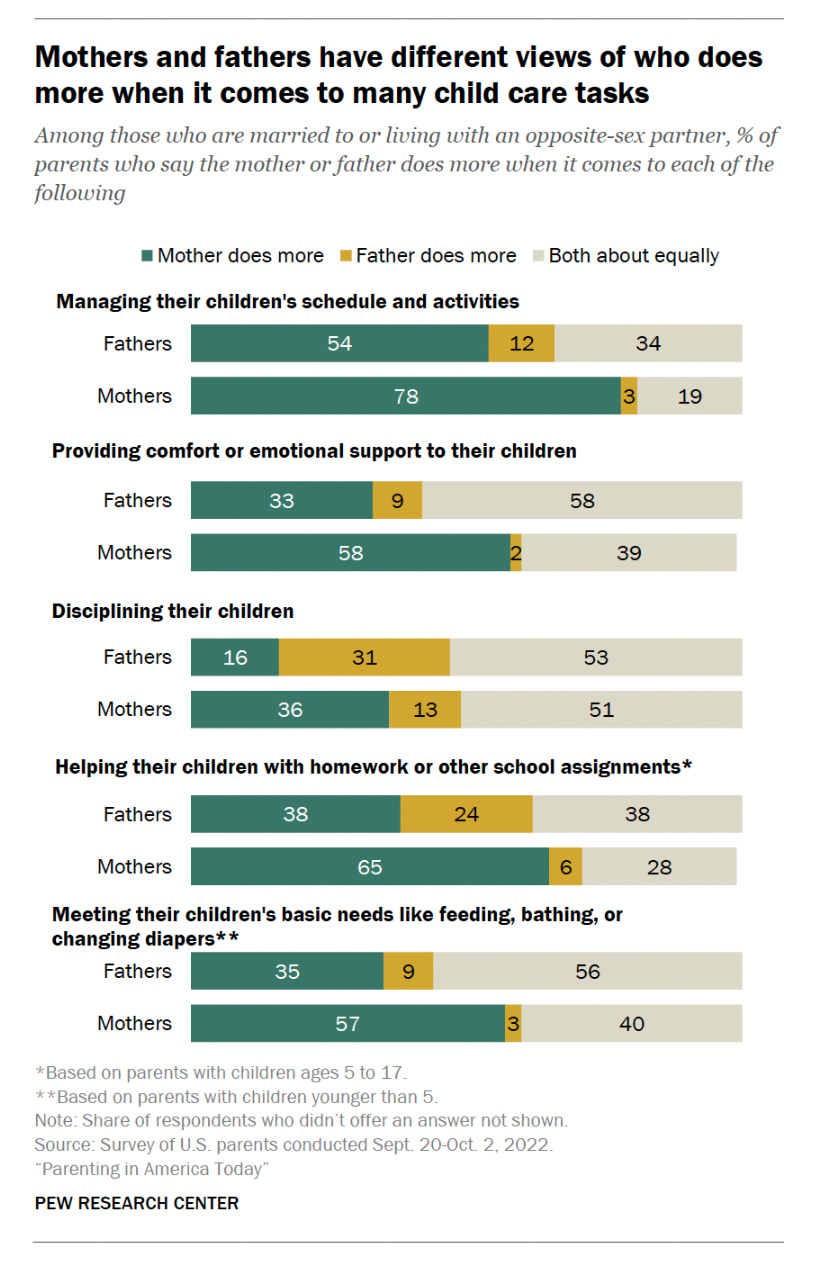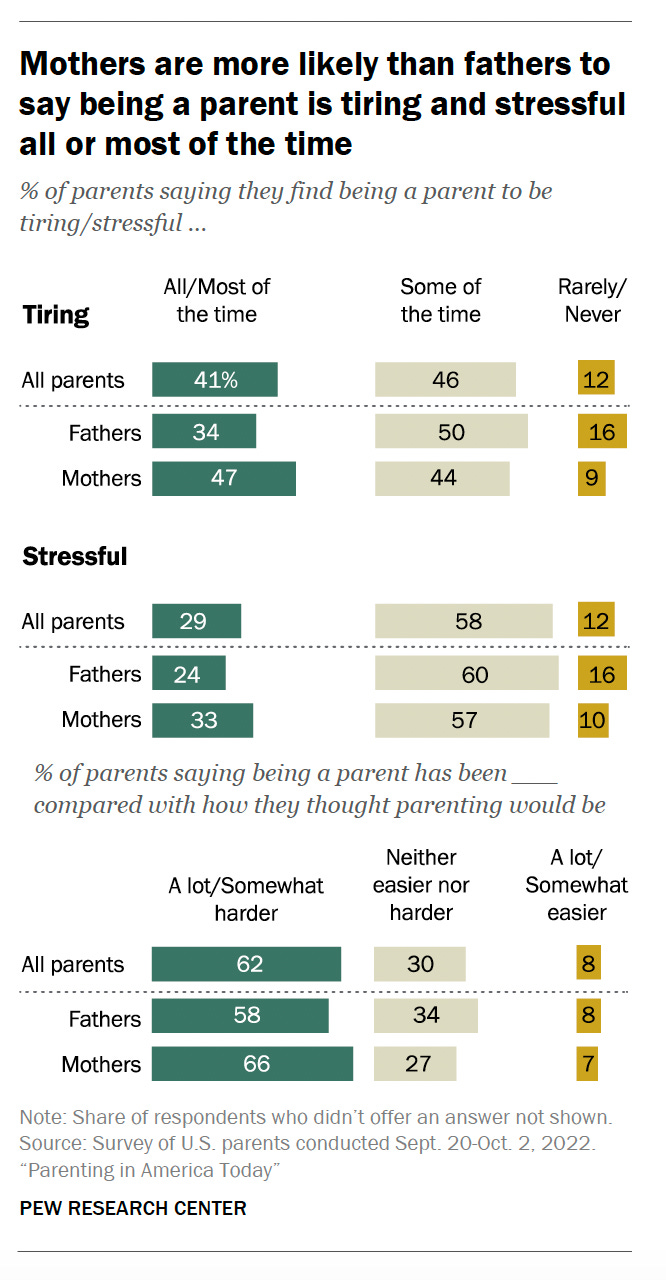The sticky floor
Women have proven they can be anything, but that doesn’t mean we should be responsible for everything

When I wrote my bio for my content consulting business in 2020, I decided to do something different. I didn’t want to just regurgitate my LinkedIn profile, so I answered the Proust Questionnaire to help potential clients get to know me better. If you’re not familiar with the questionnaire, it asks about all sorts of things — from your favorite fictional hero (Mrs. Basil E. Frankweiler) to what qualities you admire in a man (intelligence) and a woman (also intelligence). My response to question #20 surprised me. “If you were to die and come back as a person or a thing, what would it be?” I had never thought about this, but the answer came to me quickly: the secondary parent.
Think about it: You get to experience parenthood without being in charge of everything, everywhere, all at once (my new favorite expression). The default parent is a concept that’s hard to explain, but you know it when you see it. Once during a lunchtime discussion of parenting, for instance, a male colleague innocently asked, “How do you know who the default parent is?”
“What’s your pediatrician’s phone number?” I asked.
“I don’t know,” he said.
My response: “You’re not the default parent.”
There’s been a lot of talk lately about the mental load of motherhood and the invisible labor of running a home and family. But in our capitalist society, it’s not a real thing until someone builds a business around it. And now they have. There’s a slew of startups selling virtual assistant (VAs) and personal assistants (PAs) to moms. The websites say these apps are for “families,” but the branding implicitly (and, in many cases, explicitly) targets moms.

The founder of Sherah started her business because she realized she needed to clone herself. “Mom quits her job to keep others from quitting their jobs,” reads the headline of her website bio. Yikes. Equivity proclaims, “Every mom deserves a little bit of help.” But apparently not from the people who actually live with her (i.e., her partner and kids).
Look, I don’t want to pick on these entrepreneurs. They’ve identified product-market fit, and they’re capitalizing on it. Good for them. But the mere existence of these services underscores a problem: We expect too much from women and moms, and they’re drowning. They’re hanging on by the skin of their teeth.
This Women’s History Month, as the media and the biggest brands extoll all the women who’ve shattered a glass ceiling, I can’t stop thinking about the “sticky floor,” the employment patterns that keep workers — mainly women — on the lower rungs of the career ladder with few chances of upward mobility. And while the term is used to describe workplace conditions, I think it even more aptly describes what’s happening in our own homes.
Time and again, research shows that moms do more of the parenting, even when both parents work outside the home. In fact, contemporary working moms spend as much time with their children as stay-at-home moms did in the 1970s. The research also shows that fathers tend to overestimate how much parenting they do. (Let’s not forget this doozy of a headline from the early days of the COVID-19 pandemic.)
The Pew Research Center recently conducted a survey of 3,757 U.S. parents with children under age 18 to better understand how American parents think about parenting. It’s chock-full of fascinating data. But for the purposes of this discussion, let’s just look at who says they do what and their stress levels.
How did we get here? Paid leave for mothers — when available — and the lack of it for fathers (or fathers who don’t take it), schools that call the mom (not dad) every time a kid gets sick in class, Evites that only land in the mom’s inbox, even the fact that we use the phrase “working moms” but not “working dads,” position women as the default parent. “[These social factors] conspire to influence gatekeeping behaviors, placing mothers in the role of primary caregiver and placing fathers in the secondary position as helper,” explains Sarah Schoppe-Sullivan, a professor of psychology at Ohio State University, in a recent WSJ article. After a few years of establishing caregiving and domestic norms in your own home or social circle, it can be very hard to get that toothpaste back in the tube.
My life is much easier than most moms’, but being the default parent is work. Physical work, emotional work, cognitive work. It eats up my time and my energy. The story of how I got here is long and complicated and — in many ways — private. But for as long as I can remember, the conversation during Women’s History Month has focused on whether or not women can have it all. This March, I’d love to shift the focus to women having less. Less of the unpaid work. Less of the thankless labor. Less of the domestic burden. How do we make that happen? I have a few ideas for changes you can make in your home.
Share the burden
I’m encouraged by the Fair Play movement inspired by Eva Rodsky’s NYT bestseller (which is now also a card “game,” a documentary, and a school curriculum). I think Fair Play should be used in premarital counseling. The curriculum is also probably more important than any Lamaze class you could ever take. But I recognize that it’s easier said than done. My favorite line from the film’s trailer (see below)? “For women to step into their full power in the world, it requires men to step into their full power in the home.”
Update the job description
Unpaid domestic labor makes all other labor possible. So it makes sense that we would borrow a few ideas from the workplace. As families welcome new “team members,” it’s important to reevaluate who’s doing what and consider a reorg. Going from one kid to two children, for instance, is a 100% jump. Which makes this the perfect time to consider reshuffling household and parenting duties. Same goes for any family milestone: the start of a new school year, when you acquire a pet, when your kid commits to that travel team, or you or your partner start a new job. Approach each of these events as an opportunity to re-evaluate who’s doing what and rewrite the job description accordingly.
Host a weekly family meeting
Family meetings can help, too. It may sound ridiculous, but when all three of our children lived at home, these weekly sessions after Sunday dinner were a lifesaver. All five of us would sit down and eat dessert while we talked through the family calendar for the week. It helped my husband and me think through logistics together, and hopefully taught our kids a thing or two about communication, partnership, and time management.
Hire help
I truly believe most work expands to the amount of time we have for it. When I was a stay-at-home mom, I did nearly all of the things because I could. When I went back to work full-time my kids were 7, 10 and 13, and I no longer had the time or the desire to do so much. My husband and kids took over some duties. (Everyone in my house is responsible for their own laundry, for instance, but that took a few years). We let some stuff go (we eat out more now). And we outsourced some stuff.
My friend Stevie helped me wrap my head around this last point. Time is finite, which is what makes it precious, she explained. “You have to know what your time is worth. It helps to put a dollar value on it.” That way you can decide when it makes sense to do something yourself and when it makes sense to outsource it. “I can spend two miserable hours grocery shopping or I can pay the premium for Instacart delivery—5% of my order total plus 3.99 delivery fee. Let’s say a total of $15.” she explains. “Is my hourly rate worth more than $7.50? For sure. But maybe when I look at a house cleaning fee of $300, it makes sense to clean it myself and I actually feel like I am saving money.”
Swap services
When I was a youngish mother of one, we didn’t have enough discretionary money to hire help. Even paying for an occasional babysitter was tough. So my friend Devereaux and I came up with an arrangement. I babysat for her daughter every other Monday night so she and her husband could go out on a date. And she did the same for me and my husband on alternate Mondays.
Before meal services were a thing, my friend Kathryn and I did a dinner swap. I cooked for her family once a week by doubling whatever I was making for my family. She did the same thing for my family once a week. So we both knew that at least twice a week we’d have a decent meal on the table.
Warning: As these two examples — and the outsourcing example above — illustrate, swapping services or hiring help can easily become just one more thing the woman gets stuck managing, which is still work and still unfair.
Be more selfish
Because I’ve been the default parent for so long, it’s always been easier for my husband to leave town or block off an afternoon for personal or professional reasons. It took years, but I’ve finally gotten comfortable just putting my stuff on the calendar and saying, “I’m not available for that [class meeting, to cook dinner, to coordinate that sleepover].” I even set boundaries when my kids try to make demands of me during the work day. If my 20-year-old texts me about something in the middle of the day, I often say, “I’m working. We can talk about this later.” Then she bugs her dad and he deals with it.
Let your kids lighten your load
Of course, your kids can help, too. Yes, when they’re little it seems like it’s easier to just do the chores yourself, but think of this time as a very long onboarding process so that when they’re tweens and teens they can be truly helpful by watching the younger kids, running errands, and overseeing pet care (or whatever is helpful to you.).
The Blessing of the Skinned Knee is my favorite book about parenting. In it, the author Wendy Mogel, Ph.D. says chores help give your children a sense of their obligation to other people. But chores also give them survival skills. By enlisting your children’s help, you’re not just lightening your burden, you’re preparing them for adulthood and partnership so that someday we can stop having this conversation ad nauseam.
There are no simple solutions for domestic inequality. And I certainly don’t pretend to have it all figured out. But if motherhood were a “real” job, many of us would quit. And if women feel the need to clone themselves by hiring a personal assistant, something is terribly wrong. This is a conversation we can no longer afford to avoid. Women’s History Month seems like the perfect time to start talking.
Also on my mind
Speaking of personal assistants, this piece about fake assistants was fascinating (and, at times, a little gross).
I met my husband when I was 20 and he told me I seemed like I was 30 (which he meant as a compliment). Today, I’m 51 and feel 40. What explains this gap between your actual age and how old you are in your head? Jennifer Senior explains.
This is a fascinating cartoon about the concept of “maiden names.”
I love the simplicity of Austin Kleon’s three tips for public speaking.
What I wouldn’t give for artificial intelligence capable of asking burning questions like these. (Alyssa Brandt cracks me up.)
Give your meeting agendas a makeover with these great ideas from Trello.
These Tik Tok blondies really were incredible. I haven’t been in the mood to bake in ages, but couldn’t resist how easy these looked. And, man were they good. I heeded the suggestion of another user and topped them with flaked sea salt. Yum. (You can find the recipe at the link in her bio.)
According to experts, the average North American buys way too much clothing. So just how big is a sustainable wardrobe? The answer will sound generous until you start counting the items in your closet.
This article about why eye creams are so expensive confirmed two things I’ve always believed without proof: 1. Most beauty products are really similar. 2. And they’re mostly really inexpensive to make. Drugstore beauty forever!
I was never any good at science, and I can’t tell if this is staged, but it still amused me.










Whoa thank you for writing this, it landed for me hard and I’m not a parent!!